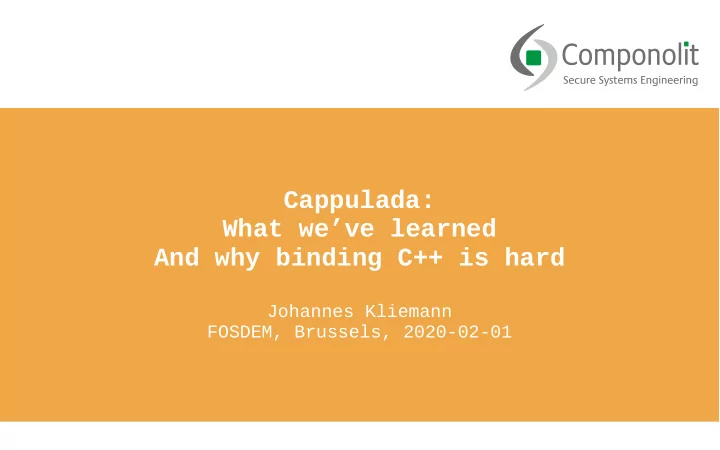

Cappulada: What we’ve learned And why binding C++ is hard Johannes Kliemann FOSDEM, Brussels, 2020-02-01
Recall Cappulada 2019 Goals ■ Automatically bind C++ APIs to ■ Existing solutions (GCC) Ada ▪ No template support ■ Maintain API layout and type safety ▪ No proper support to use non- ■ Maintain semantically appropriate valid identifiers in Ada mappings ▪ Generates uncompilable code ■ Generate mangled symbols ▪ No automatic handling of ■ Detect and avoid name collisions constructors/destructors ■ Be SPARK compatible where ▪ Fixing requires maintaining a fork possible in the long term ■ Be better than existing solutions 2020-02-01 2
Recall Cappulada 2019 Achievements and Shortcomings ■ Shortcomings ■ Achievements ▪ Partial template specialization ▪ Templates ▪ Typedefs on specific types ▪ Classes, namespaces, nesting ▪ Auto keyword ▪ Inheritance, with virtual classes ▪ Operator overloads ▪ Builtin types, typedefs, enums, arrays, pointers, references ▪ Function templates ▪ Member functions, function ▪ Merging multiple equally named pointers namespaces ▪ Private, public, protected scopes ▪ Destructors ▪ Mangling ▪ Multiple inheritance 2020-02-01 3
Why is it hard? Complexity and Semantics ■ Both languages are complex ■ Inherent semantic differences ▪ Ada 2012 Standard has ~1300 ▪ Arrays: separate type in Ada, pages builtin construct in C++ ▪ C++17 Standard has ~1600 ▪ C++ templates can be used for pages meta programming, Ada generics cannot ▪ C++ builds upon C so we need to support C, too ▪ Both have different calling conventions ▪ C11 Standard has ~700 pages 2020-02-01 4
What doesn’t work? 2020-02-01 5
What doesn’t work? Using Ada Generics with C++ Templates template <typename T> class A ■ Templates in C++ are static { ■ Linker symbol is generated from void inc(T *t); the template arguments }; ■ Template arguments are always static A<int>::inc(int *t); _ZN1AIiE3incEPi 2020-02-01 6
What doesn’t work? Using Ada Generics with C++ Templates generic type T is private package A is type Class is limited null record with Convention => CPP; procedure Inc (This : in out Class; X : in out T) with Import, Convention => CPP, External_Name => “_ZN1AI” & M (X) & ”E3incEP” & M (X); -- _ZN1AIiE3incEPi end A; a.ads: entity for aspect "Import" must be a static expression a.ads: non-static function call (RM 4.9(6,18)) 2020-02-01 7
What doesn’t work? Using Ada Generics with C++ Templates ■ Theory ▪ Overloading M for Mangling ■ Practice ▪ Overloading doesn’t work on function M (X : Integer) private types return String ▪ Return value of M is not static is (“i”); ▪ Generic formal parameters are never considered static ■ Potential Solution ▪ Preprocessor 2020-02-01 8
What doesn’t work? C++ Pass by Value type A is limited record X : Integer; end record with class A Import, { Convention => CPP; public: int X; function Con return A with A(); Import, Convention => CPP, }; External_Name => “...”; pragma CPP_Constructor(Con); 2020-02-01 9
What doesn’t work? C++ Pass by Value class A { procedure Print (X : A) with public: Import, int X; A(); Convention => CPP, }; External_Name => “...”; void print(A a); 2020-02-01 10
What doesn’t work? C++ Pass by Value ■ Problem: A will be passed by reference from Ada but expected by value in C++ ■ Considered Solution: Import Print with Convention C_Pass_By_Copy ■ Problem: C_Pass_By_Copy Convention allowed only for record type ■ Potential Solution: Define a record identical to the class ■ Problem: Unable to convert between both safely (unlike in C++) 2020-02-01 11
What doesn’t work? Automatic destructor calling ■ Automatically called destructors are not supported in the compiler ■ Destructor could be called manually ■ Controlled objects can implement this functionality 2020-02-01 12
What have we learned? ■ Even if everything fits it’s much work ■ Some things could in theory work ▪ With really high effort ▪ With additional tools ▪ At the cost of usability and safety ■ Some things just won’t work at all 2020-02-01 13
Don’t you fear that you import the weirdness of C++ into Ada? 2020-02-01 14
YES! 2020-02-01 15
Questions? Gneiss: A Nice Component Framework in SPARK Sunday 12:00 K.4.601 (Microkernel devroom) Johannes Kliemann kliemann@componolit.com @Componolit · componolit.com · github.com/Componolit 2020-02-01 16
Recommend
More recommend